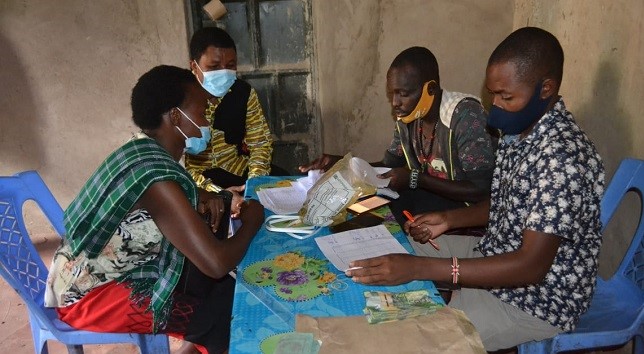More than 3,000 sunflower farmers in the semi-arid belt of Meru County have started receiving cash payments from a climate change and COVID-19 adaptation project launched in Kenya less than six months ago.

The project. dubbed Tujiinue Tena (Kiswahili for Building Back Better), is aimed at cushioning smallholder farmers from the adverse effects of climate-induced droughts and COVID-19 through the cultivation of drought-resistant and fast-growing sunflower crop.
Initial payments for the first harvest started on Monday, April 26, 2021.
“The 3000 small scale farmers receiving their payment today is a testimony of what private-public partnership can do in furthering adaptation initiatives,” said Dr Mithika Mwenda, the Executive Director of the Pan-African Climate Justice Alliance (PACJA), the civil society organisation behind the project.
Mwenda added that the success of the Meru project would not only spur similar projects in Kenya, and around Africa but it will also open opportunities for faster disbursement of climate finance to adaptation projects globally.
Adaptation in Africa currently attracts only 25% of climate finance despite the agreed goal of increasing adaptation finance to 50% or equal to mitigation finance.
The project is a three-way partnership between farmers, the PACJA and an edible oils firm BIDCO Africa.
In this partnership, while PACJA mobilised and sensitised communities to be climate-smart, a seed-producing firm, the Kenya Seed Company offered to distribute proven sunflower seeds and the subsequent extension services support to farmers. BIDCO Africa also committed to purchasing all the produce for its cooking oil production lines and thus assured farmers a ready market under a Contract Farming model.
The planting of the crop started mid-October last year and harvesting was done in mid-January. On average, farmers reported harvesting close to half a ton per acre.
Jacob Kirimi, the project coordinator, said the performance of the crop was within the recommended yields by the Ministry of Agriculture. Under the recommended management practices, the farmer can obtain 8 – 10 (50 kg bags) of sunflower per acre.
The project was launched when farmers in the area suffered from the effects of the lockdown put in place by the government to minimise the spread of the COVID-19 pandemic. The measures had badly affected Miraa (khat) transport to major towns and thus the income of these farmers who had relied on Miraa all their lives.
However, Kirimi added that the lockdown was a blessing in disguise as farmers now realise that there is an alternative to growing miraa.
Dr Mwenda said the sunflower project exemplifies the “locally-led action track” spearheaded by the Global Commission for Adaptation (GCA) and Washington D.C.-based World Resources Institute which aim to spur funders and intermediary institutions to expand financial resources available to local governments, community-based organisations, and other local actors.
